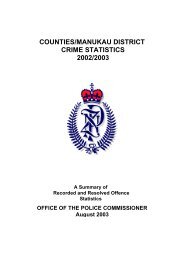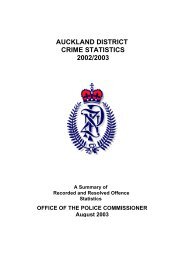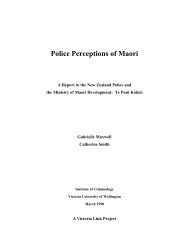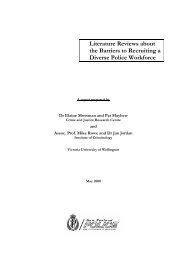Electronic Crime Strategy to 2010 - New Zealand Police
Electronic Crime Strategy to 2010 - New Zealand Police
Electronic Crime Strategy to 2010 - New Zealand Police
You also want an ePaper? Increase the reach of your titles
YUMPU automatically turns print PDFs into web optimized ePapers that Google loves.
<strong>Police</strong> Strategic Plan <strong>to</strong> <strong>2010</strong>,<br />
Strategic Goals:<br />
Community Reassurance:<br />
• provide opportunity for<br />
participation<br />
• set local priorities<br />
• work in partnership<br />
• provide protection<br />
Policing with Confidence:<br />
• evidence based proactive<br />
policing<br />
• timely and effective response<br />
<strong>to</strong> calls for service<br />
• thorough investigations<br />
• effective resolutions<br />
Organisational Development:<br />
• leadership and people in<br />
policing<br />
• integrity and accountability<br />
• technology and innovation<br />
Goals and Objectives<br />
<strong>Police</strong> will actively support government goals and initiatives enabling information,<br />
communications, and technology (ICT) in <strong>New</strong> <strong>Zealand</strong> and furthering international<br />
commitments <strong>to</strong> enhance <strong>New</strong> <strong>Zealand</strong>’s cyber security and cyber crime defences.<br />
<strong>Police</strong> will build the capability and credibility <strong>to</strong> effectively investigate and<br />
resolve e-crime.<br />
<strong>Police</strong> will target the following objectives in keeping with overall strategic goals of<br />
community reassurance, policing with confidence, and organisational development.<br />
Key initiatives of Partnerships, Organisation, Capability, and Integrity contribute <strong>to</strong><br />
achieving the objectives.<br />
Community Reassurance<br />
Organisational Development<br />
Policing With Confidence<br />
Partnerships<br />
Responsiveness<br />
Intelligence<br />
Investigations<br />
Forensics<br />
Form significant e-crime prevention and detection<br />
partnerships through collaboration with other<br />
Government, international, and industry groups.<br />
Respond <strong>to</strong> offending by investing in capability<br />
<strong>to</strong> effectively detect and apprehend criminals<br />
where electronic media is used for, or<br />
associated with, the commission of crime.<br />
Adopt an intelligence-based approach <strong>to</strong><br />
analysing e-crime problems, producing quality<br />
information <strong>to</strong> support the deployment of<br />
resources.<br />
Improve front-line investigative capability,<br />
response, and understanding of e-crime<br />
through enhanced skills and <strong>to</strong>ols.<br />
Meet increasing forensic specialist and interjurisdictional<br />
demands, by focussing the ECL<br />
with the capacity, <strong>to</strong>ols and skills <strong>to</strong> meet<br />
international labora<strong>to</strong>ry standards.<br />
Organisation<br />
Integrity<br />
Partnerships<br />
Capability<br />
Organisation<br />
<strong>Police</strong> will demonstrate their commitment and understanding of the significance<br />
and priority surrounding e-crime by establishing the National Cyber <strong>Crime</strong> Centre<br />
(NC3) and aligning the <strong>Electronic</strong> <strong>Crime</strong> Labora<strong>to</strong>ries (ECL) under a single national<br />
structure.<br />
A nationally focussed unit will improve <strong>Police</strong>’s coordination with Government<br />
and key industry groups within <strong>New</strong> <strong>Zealand</strong> and other international groups and<br />
jurisdictions – both at strategic and operational levels.<br />
National Cyber <strong>Crime</strong> Centre (NC3)<br />
The National Cyber <strong>Crime</strong> Centre (NC3) is a specialist e-crime response and<br />
investigation group that will:<br />
• provide a single reporting point for e-crime able <strong>to</strong> be accessed through<br />
traditional telephone reporting channels and through enhanced Internet<br />
contact points, enabling the collection and investigation of complaints<br />
• coordinate <strong>Police</strong>’s response <strong>to</strong> e-crime reported in <strong>New</strong> <strong>Zealand</strong><br />
• coordinate <strong>Police</strong>’s response <strong>to</strong> trans-national e-crime – in which there<br />
can be any combination of <strong>New</strong> <strong>Zealand</strong> or overseas victims, offenders,<br />
and technologies involved in the commission of an offence<br />
• proactively target and electronically patrol places where crime occurs,<br />
focusing on high priority areas such as organised crime, violence, and<br />
online child exploitation<br />
The NC3 will be a national facility with a central base and core team of dedicated<br />
specialists located in Welling<strong>to</strong>n, working closely with the specialist capability already<br />
existing within the ECL. The central Welling<strong>to</strong>n location aligns with key partner<br />
organisational structures and response units eg Centre for Critical Infrastructure<br />
Protection (CCIP), Interpol, Cus<strong>to</strong>ms, and the Department of Internal Affairs (DIA).<br />
The NC3 will complement traditional investigations, assisting initial high-level e-crime<br />
investigations <strong>to</strong> determine criminal activity, and providing specialist assistance<br />
where criminal activities enter the electronic world.<br />
The principles and pro<strong>to</strong>cols surrounding how the NC3 will operate need <strong>to</strong> be<br />
identified and agreed, and this will be cognisant of similar centres established by<br />
other jurisdictions (and their lessons learnt), and any wider sec<strong>to</strong>r initiatives that<br />
might arise <strong>to</strong> establish a <strong>New</strong> <strong>Zealand</strong> based computer emergency response<br />
team (NZCERT).<br />
Appendix A contains a high-level diagram of the e-crime structure.<br />
Australasian <strong>Police</strong> agencies<br />
have established the Australian<br />
High Technology <strong>Crime</strong> Centre<br />
(AHTCC). Its role is <strong>to</strong> provide a<br />
nationally coordinated approach<br />
<strong>to</strong> combating serious, complex<br />
and multi-jurisdictional high<br />
tech crimes (especially those<br />
beyond the capability of single<br />
jurisdictions); <strong>to</strong> assist in<br />
improving the capacity of all<br />
jurisdictions <strong>to</strong> deal with high<br />
tech crime; and <strong>to</strong> support<br />
efforts <strong>to</strong> protect the National<br />
Information Infrastructure.<br />
The United Kingdom set up<br />
a national high-technology<br />
crime unit in the year 2000,<br />
following recommendations of a<br />
computer crime working group<br />
of the Association of <strong>Police</strong><br />
Officers. The unit has since been<br />
transferred in<strong>to</strong> the Serious<br />
Organised <strong>Crime</strong> Agency.<br />
The unit provides e-crime<br />
investigative capability and<br />
maintains a national capability<br />
<strong>to</strong> address e-crime threats. The<br />
unit also supports investigations,<br />
intelligence, technical support,<br />
and forensic retrieval of digital<br />
evidence.<br />
The Royal Canadian Mounted<br />
<strong>Police</strong> have formed a distributed<br />
network of computer crime<br />
response units under the<br />
banner of a Technological <strong>Crime</strong><br />
Program. The group research<br />
and develop computer forensic<br />
<strong>to</strong>ols and provide forensic<br />
assistance <strong>to</strong> domestic and<br />
international accredited agencies<br />
and <strong>Police</strong> services.<br />
6 E-CRIME STRATEGY TO <strong>2010</strong> E-CRIME STRATEGY TO <strong>2010</strong> 7
















